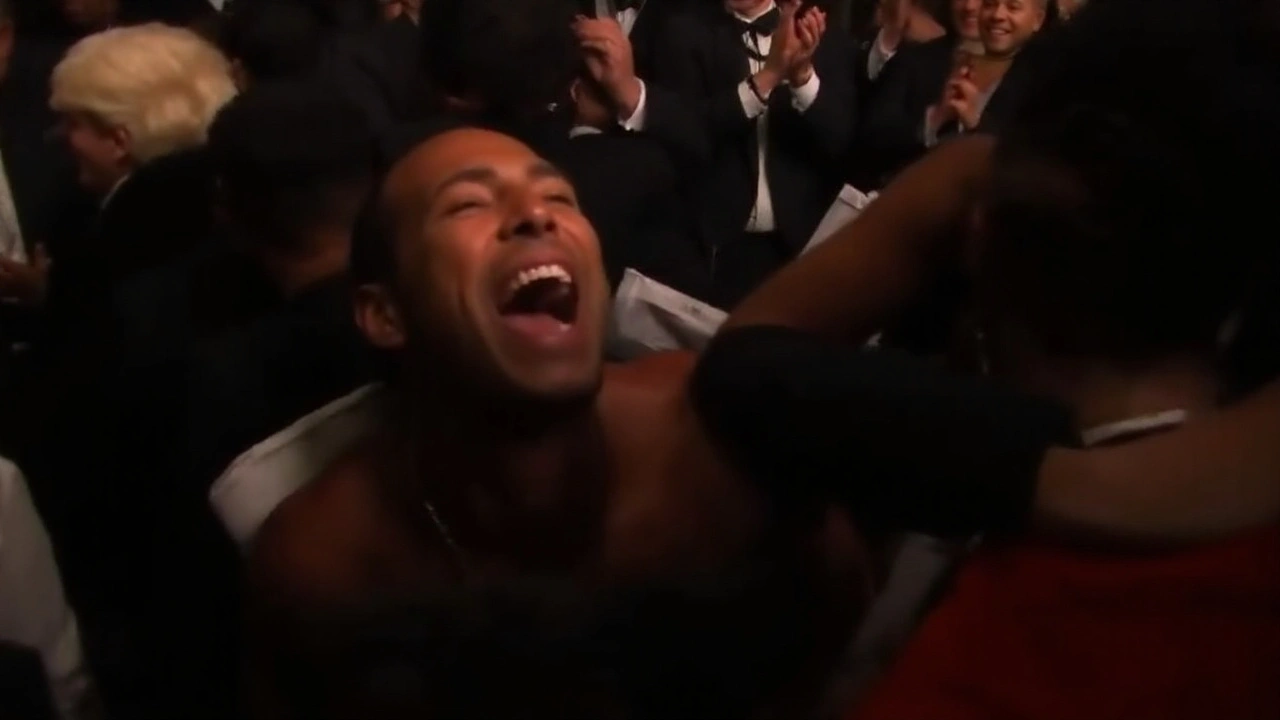A 15-year-old just rewrote Emmy history
A 15-year-old walked onto television’s biggest stage and left with a record. Owen Cooper, co-starring in the drama Adolescence alongside Stephen Graham, became the youngest-ever male Emmy winner at the 2025 ceremony, a milestone that cuts through the usual awards-season noise. The series didn’t just notch a headline—early results show it swept the big limited series categories, marking a dominant night for a project that has clearly punched above its weight.
Details on every individual trophy were still settling at publication time, and it wasn’t immediately clear whether Graham himself took home Lead Actor. What’s undeniable is the scale of Adolescence’s haul in the limited series field, the most competitive real estate on the Emmy map. That’s the lane where recent years have seen shows like The White Lotus and Beef crash into the culture with tight storytelling and top-tier performances. Adolescence now joins that club.
Cooper’s breakthrough matters beyond the trivia. The youngest Primetime Emmy acting winner on record is Roxana Zal, who won at 14 in 1984. Cooper, at 15, now holds the male benchmark. It’s a reminder that the limited series format, with its shorter arcs and deeper character focus, can propel new faces to the front of the industry faster than the old model of multi-season TV ever did.
Graham’s presence has been a gravitational force. The Liverpool-born actor has spent two decades elevating everything he’s in—This Is England, The Virtues, Line of Duty, Boardwalk Empire, The Irishman, and Boiling Point among them. He brings a kind of lived-in intensity that tends to raise the bar for everyone else on set. If Adolescence felt like an actor’s showcase, that tracks with his career pattern: find the raw story, strip away the gloss, and let performances lead.

Why Adolescence dominated—and what it signals
The limited series race is where prestige TV now lives. Short runs pull in A-list casts, top writers, and film-caliber directors, then get out before the air leaks. When a title sweeps the marquee categories, it usually means two things: the writing landed and the performances stuck. That’s the sweet spot that converts strong reviews into awards-night inevitability.
There’s also a wider shift at play. British-led dramas have been flexing on the global stage, riding co-productions and streaming deals into bigger budgets and broader reach. When a UK-rooted project storms a US awards show, it’s not an anomaly anymore—it’s the pipeline working as designed. For studios and streamers, wins like this can unlock renewed funding, new writers’ rooms, and, yes, more risk-taking.
For a teen actor like Cooper, the ripple effect is immediate. Casting directors start making calls. International press follows. The next script that lands on the table is bigger, the note from the director sharper. The industry loves clarity, and an Emmy is the clearest signal you can send.
As for Graham, whether or not a Lead Actor trophy sits on his shelf after this ceremony, the optics are already set: he steered a breakout. He has long been the go-to for grounded, working-class intensity—characters who carry quiet damage and sudden heat. Pair that with a sharp limited series and you get exactly what unfolded this year: momentum that shows up in the winners’ list.
Here’s what’s firm right now, based on the night’s early picture:
- Adolescence dominated the major limited series categories at the 2025 Emmys.
- Owen Cooper, 15, became the youngest-ever male Emmy winner.
- Full confirmation of Graham’s individual category outcome wasn’t immediately available.
What happens next is familiar in awards season. Viewership typically bumps. International sales get easier. Awards teams pivot to the next stops on the circuit, while execs weigh spin-offs, companion pieces, or second-wave limited projects with the same creative core. Even if Adolescence remains a one-and-done, its talent pool won’t be.
There’s a practical lesson in this too: the culture still rewards precision. In a TV era packed with long franchises and sprawling continuities, a cleanly executed limited series—shaped around performance—can cut straight through. Adolescence did that. And a 15-year-old carrying an Emmy offstage is the clearest proof.

Chance Remien
September 16, 2025 AT 15:49Congratulations to the entire cast, and especially young Owen Cooper; his achievement reminds us that talent can emerge at any age, and that seasoned actors like Stephen Graham serve as invaluable mentors, guiding the next generation with both rigor and generosity.
Anna Lee
September 17, 2025 AT 14:02Wow, what a night!!!, this just proves that when you blend raw teen energy with a gritty, veteran lead, the magic happens, and it’s sooo inspiring for anyone dreaming of the screen – keep shining, Owen!!
Daniel Craine
September 18, 2025 AT 12:15Another awards show, another hype machine – yeah, great, kids getting trophies while the real talent is buried under marketing fluff.
Kristen VanPamel
September 19, 2025 AT 10:29they think a teen winning is revolutionary when the industry has always chased novelty
Kasey DellaPenna
September 20, 2025 AT 08:42Totally pumped for Owen – his win is proof that hard work pays off and that shows like Adolescence can launch careers faster than a decade‑long series ever could.
Tyler Tucker
September 21, 2025 AT 06:55Honestly, the hype is overblown; a kid with a trophy doesn’t change the fact that most shows still recycle the same tropes.
julia mutambara
September 22, 2025 AT 05:09It’s remarkable how a single performance can reverberate through an entire industry, especially when that performance comes from someone so young.
When Owen Cooper walked onto the Emmy stage, he wasn’t just accepting an award; he was embodying a new paradigm for what youthful talent can achieve.
The combination of his raw energy and Stephen Graham’s seasoned intensity created a dynamic that resonated with both critics and audiences alike.
This synergy demonstrates that limited‑series formats can serve as incubators for fresh voices, providing a compact narrative space where emerging actors can shine without the dilution that sometimes afflicts longer series.
Moreover, the record‑breaking nature of his win sends a powerful signal to casting directors, encouraging them to look beyond traditional age expectations.
It also challenges network executives to invest in stories that prioritize depth of character over mere star power.
The ripple effects will likely be seen in upcoming pilot selections, where we may witness an uptick in scripts centered around teenage protagonists with complex arcs.
From a cultural standpoint, such visibility helps to diversify the stories told on mainstream platforms, offering audiences a broader spectrum of experiences.
It is also a testament to the collaborative effort behind Adolescence, where writers, directors, and producers collectively crafted a fertile ground for talent to flourish.
In the broader context of television history, this moment aligns with past breakthroughs where young actors became catalysts for change-think of Jodie Foster in the 70s or Millie Bobby Brown more recently.
Each of those milestones shifted industry perceptions, and Owen’s victory is poised to do the same for the current generation.
Additionally, the win amplifies the importance of cross‑Atlantic productions, proving that the melding of British storytelling sensibilities with American distribution can yield award‑winning results.
It also reinforces the idea that limited series are an ideal format for narrative risk‑taking, as they allow creators to tell concise, high‑impact stories.
Overall, Owen Cooper’s Emmy not only crowns his personal achievement but also heralds a promising shift toward greater inclusivity and artistic daring in television.
Nelleke Elston
September 23, 2025 AT 03:22Sure, the buzz is loud, but let’s not pretend this is a seismic shift; it’s just another data point in the ongoing debate about age and prestige in TV.
tanay bole
September 24, 2025 AT 01:35From a broader industry perspective, the success of Adolescence underscores the efficacy of cross‑Atlantic co‑production models, which combine British narrative sensibilities with American distribution power.
Liz Lessner
September 24, 2025 AT 23:49Great news! I think this could open many doors for young actuors and show that even in a crazy industry, dedication + talent can really pay off.
Mayank Mishra
September 25, 2025 AT 22:02What does this win actually mean for casting pipelines in Bollywood? Are we going to see more teen actors from India being pushed onto the global stage now?
Reid Vance
September 26, 2025 AT 20:15Fact check: Owen Cooper is the youngest male winner, but the overall youngest acting winner remains Roxana Zal, who won at 14 in 1984 – a reminder that the Emmys have a long history of breakout youth talent.
Javier cox
September 27, 2025 AT 18:29yup totally agree, Julia! This win shows how diverse stories can break barriers and bring fresh perspectives to a global audience.